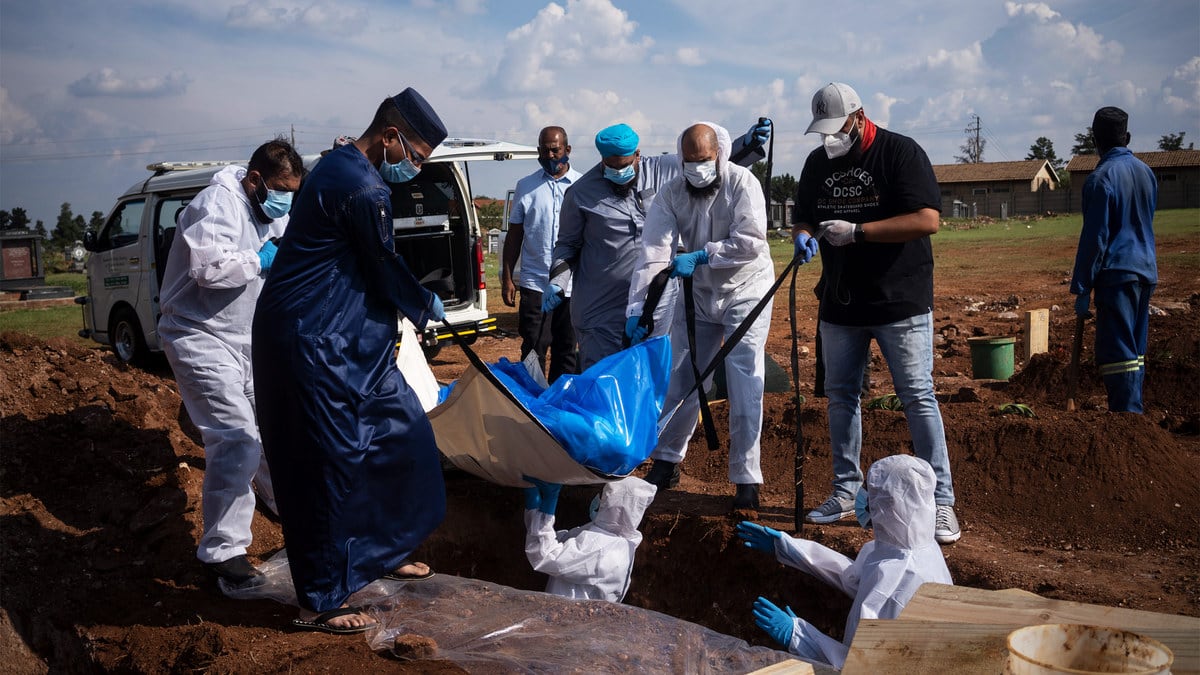ABUJA, Nigeria—Since the start of the year, Zimbabwe's oldest cemetery has been extremely busy. Gravediggers are having to dig over a dozen graves on a daily basis at the Warren Hills Cemetery in the capital, Harare, as the number of deaths from coronavirus continue to grow at disturbing rates.
“The number of daily burials at the cemetery has almost quadrupled since the beginning of 2021,” Stephen Bwalya, a commercial taxi driver who lives close to the cemetery, told The Daily Beast. “Most of the victims died from coronavirus.”
In the last two months, Zimbabwe has witnessed a drastic increase in the number of coronavirus infections and deaths. About 35,000 cases and more than 1,300 deaths have so far been confirmed—a huge spike from the 14,000 infections and 369 deaths recorded on New Year’s Day.
ADVERTISEMENT
But those numbers are surely vast undercounts since testing has been very limited in the country, where decades of economic decline has left it with little resources to tackle the outbreak.
At a major public hospital in Harare, nurses have gone on strike in protest over the death of colleagues who lost their lives as a result of a lack of personal protective equipment, and coronavirus patients have been told to buy their own ventilators as hospitals have run out of oxygen. Even the country’s very influential elites, who can barely travel abroad for treatments owing to a number of measures and restrictions countries have put in place to tackle the spread of COVID-19, have been forced to confront the realities of Zimbabwe’s pathetic health sector. Already, four of President Emmerson Mnangagwa’s cabinet ministers have been killed by COVID-19.
“The biggest concern is the fact that many of those who need testing can’t get tested because the government is unable to test so many people,” said Bwalya. “Among the people buried at the cemetery are those who died after showing symptoms of COVID-19 but they were never tested.’
Zimbabwe isn’t the only African nation with concerns about hidden coronavirus deaths.
Last June, an investigation by The Daily Beast revealed how gravediggers in the northwestern Nigerian city of Kano buried dozens of people, who had died secretly from COVID-19, in one of Kano’s biggest cemeteries. The finding was followed by a report by the BBC which revealed that cemeteries in Somalia, where government figures claim only about 135 people have died from the coronavirus, have been filling up at alarming rates with people who lost their lives as a result of the pandemic.
Across the continent, there's been a spike in the number of coronavirus deaths especially since the beginning of 2021.
According to the Africa Centres for Disease Control (CDC), fatality rates across the continent are exceeding the average in other parts of the world. Of the 55 African countries the CDC monitors, about 21 are reporting fatality rates above the current global average of 2.2 percent. The fatality rate for the continent has shot up in the last seven months—from 2.1 percent in July to 2.6 percent this February.
Across the continent, about 40 countries are experiencing a second wave of the pandemic, mostly associated with new variants that appear to be more transmissible.
In South Africa, Africa’s most advanced nation, the World Health Organization (WHO) said a new variant of the virus known as 501.V2 emerged in the country last year and seems to “spread more readily between people.” A similar variant has also been identified in Nigeria, the continent’s largest economy, where infections—and deaths—have been on the increase in the last two months.
“Our case fatality rate is becoming very troubling,” John Nkengasong, director of Africa CDC said at a recent press conference in Addis Ababa, the Ethiopia capital. “It used to be the reverse.”
With most of Africa’s over 50 countries debt-ridden and under-resourced, the continent is struggling hard to increase coronavirus testing. Despite having about 1.3 billion people, only about 30 million tests have been recorded since the pandemic began. The continent is now looking elsewhere for help.
More than a week ago, the Rockefeller Foundation announced a grant of $12 million to the Africa Public Health Foundation to help expand testing and strengthen community-level contact tracing for COVID-19 in Africa through the Africa CDC. For a continent very anxious to know the true extent of how widely the pandemic has spread, this development brings much relief.
“Testing is the No. 1 tool to fight this pandemic because without testing we will be fighting blindly,” said Nkengasong. “We also need to trace people who are infected, isolate them and treat them. By supporting African Union Member States to do more testing and tracing to identify and isolate infected persons, we will be able to control the virus and limit transmission.”
As the continent waits for an improvement in coronavirus testing and contact tracing, the impact of the pandemic continues to be felt in cemeteries like Harare's Warren Hills, where dead bodies flood in every day.
“In my many years of living near the cemetery, I haven’t seen so many people buried here on a daily basis as the case has been since the beginning of the year,” said Bwalya. “Zimbabwe must do something about this disease very fast.”






